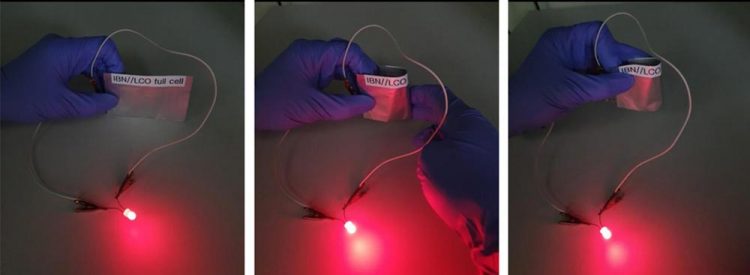How light a foldable and long-lasting battery can be?

Demonstration of the flexible battery using monolithic organic electrode Credit: Soojin Park(POSTECH)
Professor Soojin Park of Chemistry and Division of Advanced Materials Science with his postdoctoral researcher, Jaegeon Ryu and his PhD student, Jieun Kang successfully developed a flexible battery with thin and three-dimensional organic electrode in collaboration with Korea Institute of Materials Science.
Furthermore, they were able to lower the weight of a battery by 10 times more than the conventional copper collector1) by using a three-dimensional copper collector.
Instead of using a graphite anode, they utilized organic materials and were able to increase the energy density of a battery by four times and more. Their research establishment was published in the recent issue of ACS Nano.
Electrical conductivity of an organic material is low and there was no solution to integrate collector and organic material. For this reason, it had not been possible to demonstrate a monolithic electrode with organic materials before their study.
The research team studied a new way to replace a current collector that makes a battery heavy and a graphite anode with low energy density in order to lower the weight of battery innovatively.
The team produced a three-dimensional structure with high electrical conductivity by using single-walled carbon nanotube (SWCNT) aerogels. Here, they constructed thin monolithic organic electrodes by coating a nanometer-scale imide-based network (IBN)2) organic material.
The three-dimensional monolithic electrodes coated with 8nm thin and adjustable thick organic IBN layers delivered capacity of up to 1550 mA h g-1 and were possible to recharge more than 800 times. These electrodes were coated with organic materials.
Despite of their poor intrinsic electrical conductivity, they had high electrical conductivity and they also demonstrated improved electrochemical performances of rechargeable battery by helping fast transfer of lithium through abundant redox-active sites.
Moreover, thickness of coated organic materials can be controlled easily and they were able to improve current density of organic electrode greatly.
The newly developed electrode can replace the metal-based collector and this enables development of light and flexible rechargeable battery which later can be applied to wearable electronic devices, flexible devices, telecommunication and electronic vehicles of next generation.
Professor Soojin Park who led the research commented, “We can lower the weight of a rechargeable battery enormously by using this newly developed monolithic electrode with SWCNT organic materials. This can overcome the limitations of the conventional rechargeable battery and can realize flexibility and weight lightening of an organic battery.
###
This research was supported by the National Research Foundation of Korea.
Media Contact
Jinyoung Huh
jyhuh@postech.ac.kr
82-542-792-415
Media Contact
All latest news from the category: Materials Sciences
Materials management deals with the research, development, manufacturing and processing of raw and industrial materials. Key aspects here are biological and medical issues, which play an increasingly important role in this field.
innovations-report offers in-depth articles related to the development and application of materials and the structure and properties of new materials.
Newest articles

A universal framework for spatial biology
SpatialData is a freely accessible tool to unify and integrate data from different omics technologies accounting for spatial information, which can provide holistic insights into health and disease. Biological processes…

How complex biological processes arise
A $20 million grant from the U.S. National Science Foundation (NSF) will support the establishment and operation of the National Synthesis Center for Emergence in the Molecular and Cellular Sciences (NCEMS) at…

Airborne single-photon lidar system achieves high-resolution 3D imaging
Compact, low-power system opens doors for photon-efficient drone and satellite-based environmental monitoring and mapping. Researchers have developed a compact and lightweight single-photon airborne lidar system that can acquire high-resolution 3D…





















